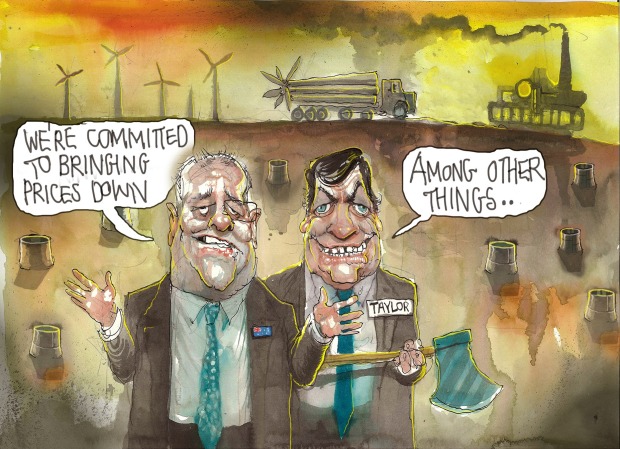
(The Australian Financial Review, Craig Emerson, 28.Oct.2018) — On November 22, 2017, a nation’s government legislated price controls in response to voter dissatisfaction with the rising cost of essential items. On October 23, 2018, the government of another nation announced it would require electricity suppliers to reduce their prices by the end of the year in response to voter dissatisfaction with the rising cost of electricity. The first country was Venezuela; the second was Australia.
Prime Minister Scott Morrison repeatedly told Parliament, swinging his arms as if holding a baseball bat, that if electricity retailers failed to cut their prices he would hit them with a “big stick”.
Morrison has become the Don Corleone of Australian politics. He has made retailers an offer they can’t refuse – cut your prices or else. The “or else” isn’t a horse’s head in the beds of the electricity retailers’ CEOs but it is something for them to fear. Asked at the media conference what the “big stick” might be, Morrison replied: “It’s everything from enforceable undertakings through the courts through to divestment powers of their assets.”
Last month, Morrison said he was open to setting up a royal commission into the energy sector. Consider the politics of the “big stick” of an energy royal commission. In 2013, the Liberals, in opposition, promised that, if elected, they would axe the Gillard government’s horrific carbon tax and cut electricity prices by $550 per household. Now, after five years of government, the Liberals, having presided over ongoing electricity price rises, would be promising to establish a royal commission. It would be the most spectacular admission of failure, that the Liberals had not only broken their solemn promise to slash electricity prices but also remained clueless as to what to do next.
As to the “big stick” of forced divestiture, the Liberals would be legislating to break up companies if they failed to reduce their prices ahead of an election. If forced divestiture is good for the electricity industry surely it will be judged good enough for every other business.
Consider the enormity of this threat: do as we say or we will break you up. Former deputy prime minister and aspirant, Barnaby Joyce, has already called for forced divestiture to be extended to all industries through a general amendment to the Competition and Consumer Act.
Labor in opposition and in government has consistently resisted populism and opposed forced divestiture. It is the allegedly anti-business Labor Party that is standing up for good policy. CSIRO and Energy Networks Australia have estimated Australia will need more than $200 billion in energy-sector investment by 2050. As a small, open economy, most of that investment will need to be funded from abroad. The “big stick” of forced divestiture would guarantee that funding never arrives.
Thin end of the wedge
Yet the Morrison government will not hesitate in seeking to jam Labor into supporting forced divestiture by putting up a bill that includes both a default price for electricity retailers and forced divestiture.
Labor would likely move an amendment to split the bill, voting for the default price but against forced divestiture. But the Morrison government would use its numbers – supported by several independents – to ram through the original bill.
Then the bill would go to the Senate where a coalition of the Liberals, Nationals, Greens and independents would pass it into law. Forced divestiture would become a permanent feature of Australia’s competition laws; Labor would never have a majority in the Senate to repeal it.
If that isn’t worrying enough, contemplate the precedent set by a Liberal government requiring an industry to drop its prices ahead of a federal election. What’s next? Petrol prices, gas prices, grocery prices, bank interest rates.
The Business Council of Australia’s muted response – relegating forced divestiture to the 10th paragraph of its mostly positive media release – suggests it has concluded only a few of its members would be affected. That would be a fatal misjudgment.
Imagine if Labor had announced mandating that businesses must cut their prices ahead of elections. Shrieks of “socialists!” would ring out of Australia’s boardrooms, and multimillion-dollar advertising campaigns would be hastily organised. Business organisations would rightly use every available platform to argue that perceptions of sovereign risk would be elevated to the point where foreign investors judged Australia to be off limits.
Yet under Morrison’s Liberals, aided by deferential Business Council of Australia, it’s full steam ahead. Venezuela here we come!
Craig Emerson is CEO of the Craig Emerson Economics and adjunct professor at Victoria University’s College Business. He is a former competition policy minister and has advised various energy companies.
***
#LatAmNRG